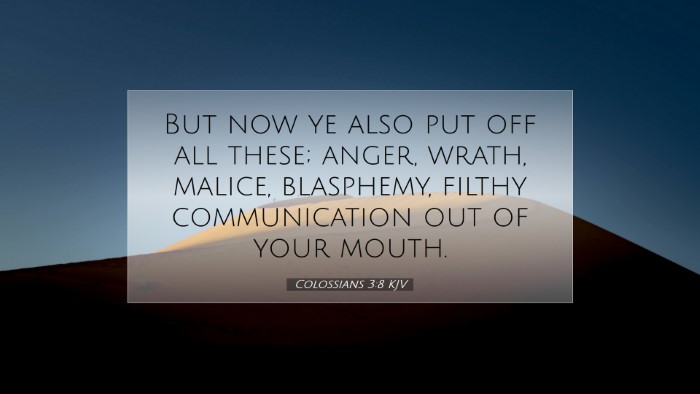Commentary on Colossians 3:8
Verse: "But now ye also put off all these; anger, wrath, malice, blasphemy, filthy communication out of your mouth."
Introduction
The apostle Paul’s epistle to the Colossians addresses the necessity of a transformed life in Christ, emphasizing the importance of shedding old behaviors that are inconsistent with the Christian faith. Colossians 3:8 serves as a pivotal transition as Paul exhorts the believers to abandon various vices and to embrace a life of holiness reflective of their new identity in Christ.
Exegesis and Thematic Insights
In this verse, Paul enumerates several negative traits that believers are called to "put off." This metaphor reflects the idea of stripping away old garments associated with a former way of life.
- Anger: The term used generally refers to a strong emotional response that may lead to unrighteous dealings. Matthew Henry highlights that this can be a passionate emotion that, if unchecked, leads to sin.
- Wrath: Different from simple anger, wrath denotes a more tumultuous, vehement outburst—a state where anger gives way to bitterness. Albert Barnes explains that wrath is more extended and potentially destructive, leading individuals to act in ways contrary to love and grace.
- Malice: This refers to an ill will towards others, harboring thoughts of injury or hatred. Adam Clarke notes that malice not only desires harm to others but often seeks opportunity to act upon those desires.
- Blasphemy: While typically associated with speaking irreverently about God, in this context, it relates to slandering others. This indicates a deeper relational decay and a lack of respect for the image of God in others.
- Filthy Communication: This encompasses all forms of crude or inappropriate speech. Paul calls for believers to cleanse their words, ensuring that their speech reflects purity and love, consistent with their calling as representatives of Christ.
The Spiritual Significance
Paul's directive to "put off" these behaviors is not merely a call to moral reform but is rooted in the believer's identity in Christ. The transformation that occurs at salvation compels believers to reject these practices which are incompatible with holiness.
Matthew Henry emphasizes the spiritual battles involved in shedding these behaviors, noting that believers must be vigilant because the old nature seeks to rise again. This requires daily commitment to God and reliance on the Holy Spirit.
Application for Believers
As we explore the implications of this verse, it is essential for pastors, theologians, and students of the Word to recognize the corporate nature of Paul's admonition. He presents these vices as detrimental not just to individual believers, but to the communal body of Christ.
- Community Impact: The observance of these traits among church members can lead to division and strife, undermining the unity that the Gospel intends to foster.
- Personal Reflection: Individuals are encouraged to regularly self-reflect on their speech and actions. This self-examination promotes personal accountability and growth in grace.
- Transformative Power: The acknowledgment of these behaviors should lead to dependence on Christ for strength in overcoming them. Just as garments are changed, believers should depend on the grace of God for their transformation into Christlikeness.
Conclusion
Colossians 3:8 encapsulates a vital aspect of the Christian experience—the ongoing process of sanctification. The call to put off anger, wrath, malice, blasphemy, and filthy communication is an exhortation to embrace a life characterized by the virtues of love and grace.
As we consider this verse, may we be motivated to live not just outwardly conforming to these standards but also thoroughly changed by the power of the Holy Spirit who enables us to reflect Christ in our interactions and communications.


